Lyme kidney donor hikes volcanoes to raise awareness of need for organ donation
|
Published: 11-24-2023 12:38 PM
Modified: 11-25-2023 10:03 AM |
LYME — In December, on the second anniversary of the day that Kate Harrison donated a kidney to a fellow Lyme resident, she will be starting to climb one of three Guatemalan volcanoes she plans to ascend with a nonprofit organization called Kidney Donor Athletes.
Harrison, 55, will join 17 other kidney donors on the climb organized by the Colorado-based nonprofit, which aims to show “strong, healthy people can continue to be strong, healthy people after donation,” she said in a phone interview.
The effort aims to normalize the act of kidney donation.
“We’re not heroes, just normal people living our lives,” she said.
While Harrison has been able to continue to live a normal life following her donation in 2021, the difference Harrison’s gift, nicknamed “Lefty,” made for the recipient, David Beane Jr., is significant.
Beane, now a 34-year-old manager at the Hanover Consumer Cooperative Society, was getting ready to celebrate his 30th birthday in 2019 with a trip to California. In advance of that trip, he went to the doctor to get checked out for a cough had lingered for months.
His doctor found that he had an elevated blood pressure. He went home with a prescription for blood pressure medication, but then he got a voicemail directing him back to the emergency room.
Blood tests revealed that his kidneys were either not working or barely working. He was in stage 5 kidney failure; it turned out it was caused by a hereditary condition.
Article continues after...
Yesterday's Most Read Articles
“I never would have known other than this cough,” he said.
With medication, he and his family were able to take that trip to Disneyland. When he came back, he finished the required testing to be on the active waiting list for a new kidney.
In early 2020, he had a port put in so he could do dialysis at home — filtering his blood through a machine since his kidneys were no longer doing their job.
Then the COVID-19 pandemic hit, and Beane was out of work. Given his condition, it wasn’t safe for him to be exposed to the virus.
When he returned, he worked an eight-hour shift and then went home and hooked up to his dialysis machine for 11 hours, beginning at about 9 p.m. and unhooking again at 8 a.m. the next morning. He bought a comfortable chair so he could rest sitting up while the machine was operating.
That routine went on for about a year.
“I don’t know how I did it, but I did it,” he said.
In early 2021, Beane got a call from Dartmouth Hitchcock Medical Center that he was third on the list for a kidney from a deceased donor. There were two available.
The transplant team told him to “go home after work, pack a bag, be ready,” he said.
The top two on the list took the two available organs, leaving Beane at the top of the waiting list. But then in March 2021, the way kidneys from deceased donors are distributed changed, so that the region including the Upper Valley now includes New York City. In a short period, Beane went from top of the list to one of thousands.
“Then my mother decided to act,” Beane said.
Michelle Sanborn-Beane posted a request to the Lyme Listserv asking that residents consider donating a kidney for her son.
Harrison said she had never intended to donate a kidney, but she was moved by Sanborn-Beane’s post. She had always given blood and at the time, in the midst of the COVID-19 pandemic in 2021, she was volunteering as much as she could.
She also hoped that “if any of my kids or myself needed an organ, people would show up.”
Beane’s care team advised his mother and her boyfriend not to take a trip they had planned in December, and then Beane saw in his myDH account that an operating room had been scheduled.
Still it wasn’t until he got a note from Harrison explaining “who she was, why she was doing it, how she found out” while he was being prepared for surgery — and she was already under the knife — that it became real to him “that this is happening.”
For Harrison, the hardest part was not being able to have visitors while she was in the hospital. Her recovery was smooth, and she was back to cross country skiing within five weeks and able to go backcountry skiing in Montana with her son at six weeks.
“I felt strong and healthy and back to myself,” she said.
When Harrison and Beane first met in March 2022, she was struck by the significance of her gift for him.
“Right off the bat — after recovery and everything — the biggest thing I noticed was my energy was back,” Beane said.
He was able to get up at 3 a.m. to work an early shift and stay up until 9 p.m. with “no naps, no nothing.”
“That was the biggest thing for me,” he said. “For other people, it was more my color.”
When he was on dialysis he “looked almost like a ghost,” but his coloring has returned to normal.
Practically, the new kidney also has meant he no longer has to sleep in the office chair with his feet up on his bed while the machine filters his blood.
“That’s a huge thing for me is not having to be hooked up to a machine every night,” he said.
After Jeff Fuller, a 68-year-old Brookfield, Vt., resident, received a kidney transplant at DHMC in mid-October, his family was able to give up the dialysis equipment he had been required to use regularly since February 2021.
In Fuller’s case, a Vermonter signed up to donate a kidney after seeing yard signs his family made in their quest to help him find the needed organ. The donor wasn’t a match for Fuller, but her donation on his behalf meant that he received a voucher that gave him priority on a national list. Four days after Jeff’s voucher was processed, the family learned there was a kidney for him.
“Neither one of us still believed this had happened,” Susan Fuller, Jeff’s wife, said in a phone interview.
Because Jeff Fuller had had a previous kidney transplant, it was more difficult to find a match.
The Fullers are “still kind of pinching ourselves,” Susan Fuller said. Jeff also is still recovering. The couple is in a three month lockdown of sorts in order to allow Jeff’s immune system to recover.
“He definitely feels better than he was,” she said.
They have a new grandchild, their fourth, whom they are looking forward to holding for the first time in mid-January when their lockdown is over.
“Life is moving on,” Susan Fuller said. “Jeff will be there for a lot more of it than it seemed like a few months ago.”
DHMC does between 23 and 28 kidney transplants annually, Dr. Michael Daily, a DHMC transplant surgeon, said. The hospital’s waiting list for kidneys has about 150 people on it.
Causes of renal failure include common conditions such as diabetes, hypertension and obesity.
“Our waiting list just keeps getting longer because there are more people who need kidneys than we can transplant,” Daily said.
To qualify to be a donor, people need to be healthy and without diabetes. Because only healthy people are selected, Daily said kidney donation doesn’t affect their life expectancy “in any measurable way.”
After donation, doctors encourage kidney donors to continue to eat healthy food in keeping with their habits prior to donation. But they’re not required to restrict their diets. In addition, kidney donors come in for regular checkups to monitor their blood pressure and other indicators.
In spite of the limited physical effect on donors of their donation, taking out donated kidneys is “the scariest surgery I do,” Daily said. As a matter of course, he leaves donors in “worse shape than they were when I started.”
As with any surgery there’s some risk of infection. But, he said, “by and large, people do great.”
Harrison’s donation doesn’t much affect her daily life. She has a small scar on her stomach and can’t take ibuprofen. She’s always been a pretty healthy eater and has continued to be so. She gets annual checkups and has remained healthy.
The upcoming trip to Guatemala is partly motivated by a previous visit to see her sister’s adopted baby, her niece, while it was “lovely,” she said, it “wasn’t a travel experience.”
“I always wanted to go back,” she said.
The timing of the hike on the anniversary of her donation, Dec. 8, sealed the deal.
“Now I’m trying to train,” she said. “I’m a little nervous.”
Nora Doyle-Burr can be reached at ndoyleburr@vnews.com or 603-727-3213.

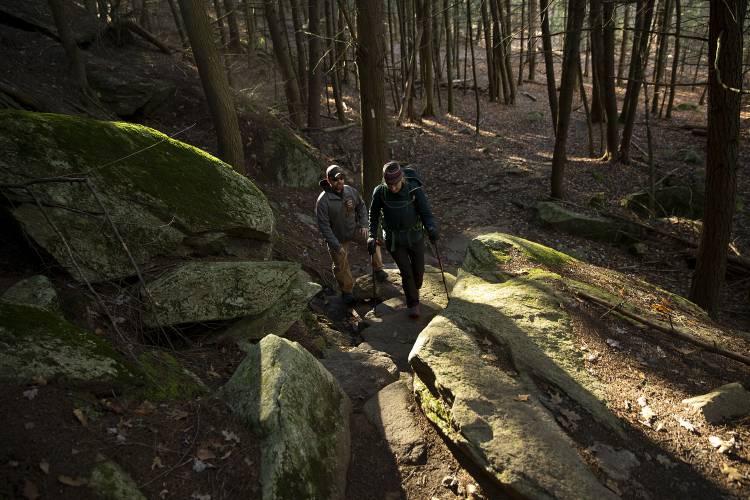
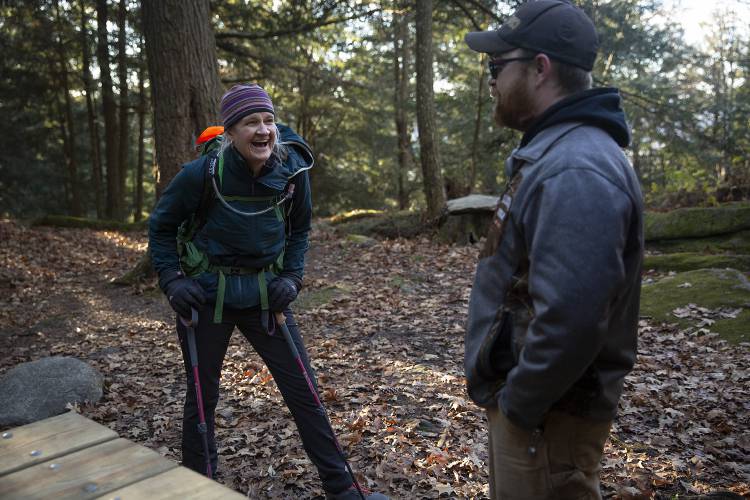
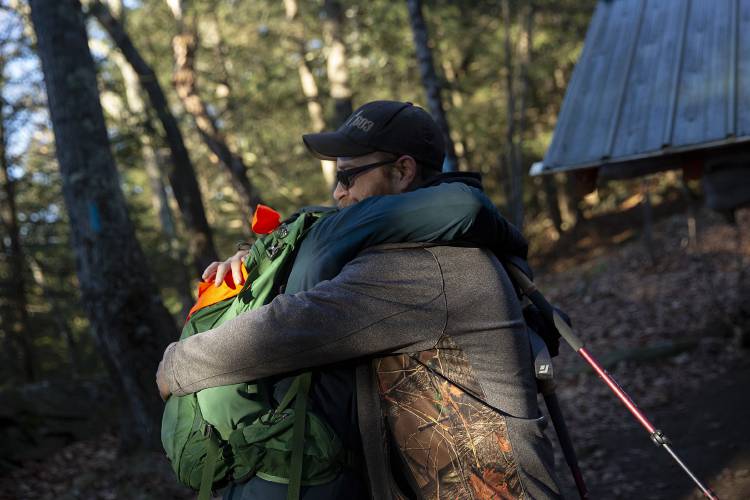
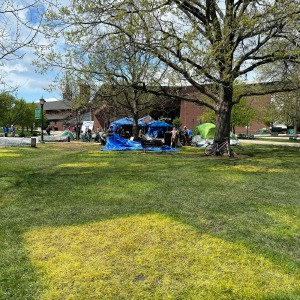 Students take down pro-Palestinian encampment at UVM
Students take down pro-Palestinian encampment at UVM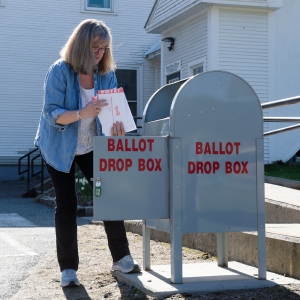 Sharon voters turn back proposal to renovate school
Sharon voters turn back proposal to renovate school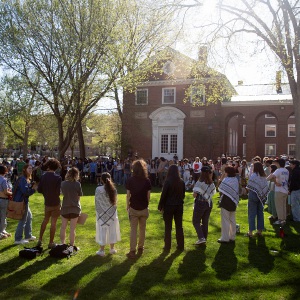 Dartmouth administration faces fierce criticism over protest arrests
Dartmouth administration faces fierce criticism over protest arrests
